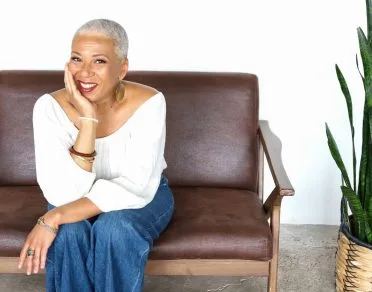By Roodgally Senatus
ImpactAlpha, October 2 — Equitable homeownership is a key strategy for narrowing racial wealth gaps. Centering Black women is key to the success of that strategy.
The Denver-based Dearfield Fund for Black Wealth launched two years ago to help Black families build wealth through homeownership. The place-based impact fund has deployed $5.7 million in down-payment assistance loans.
After helping 150 families with down-payment assistance, Dearfield has sharpened its strategy to better serve Black women, who make up 60% of the fund’s borrowers so far.
“We know that there’s an economic case for investing in Black wealth creation,” says Aisha Weeks, who manages the Dearfield Fund. “There is also a case to invest in Black women so they have a safe physical and emotional space to rest in a world that often doesn’t allow Black women to rest and be at peace.”
ADVERTISEMENT
Ownership of financial assets, even more than rising wages and income, is considered the key to narrowing the US’s yawning racial wealth gaps. The median Black family has approximately $24,000 in savings, investments, home equity and other elements of health, compared to around $189,000 for the median white family. Without a change in direction, Black family wealth could decline to zero by 2053, according to a study by Prosperity Now and the Institute for Policy Studies.
Black women are at the center of pathways to wealth creation. Black women are the fastest-growing group of entrepreneurs in the US. Business ownership is increasingly seen as a way to skirt discrimination and other racial and gender barriers in the workplace and gain more financial flexibility and stability.
The Dearfield Fund has shown that Black women need to be at the center of homeownership strategies as well. Many of the fund’s women borrowers are starting over after unsuccessful marriages and are learning about building wealth through homeownership for the first time.
“That particular part of our narrative shows that our fund is not just a racial equity play,” Weeks told ImpactAlpha. “Centering women and families is an incredible opportunity for us to know that we’re actually having an impact on the ground.”
Dearfield’s goal is to help Black families generate between $50-$75 million in equity wealth through the ownership of their homes.
ADVERTISEMENT
“There’s a roadmap for how to buy a home, but no one is telling Black families how to build wealth through homeownership in this country,” says Weeks. “How do you leverage becoming a homeowner in a way that you’re thinking about it as a personal investment that you can leverage for generational wealth, versus it just being a roof over your head?”
Bridging wealth gaps
The emerging gender-lens component of Dearfield’s strategy could become a key page of the Black wealth playbook as homeownership wealth-building models are replicated in other cities.
The Dearfield fund was incubated by Gary Community Ventures, a Denver-based community impact-focused foundation, which worked with Black community leaders in Colorado to alleviate obstacles to homeownership for Black families. Denver’s Black-white homeownership gap is one of the widest in the country. Rising home prices has made purchasing a home complex and costly.
Tisha Chapman, a single mother, was going through a divorce last year. Recovering from her abusive marriage, she was living with a relative “who was fabulous and great,” she says. “But I thought, ‘I’m 51 years old. I’m an educated woman. Why am I going through this?’”
She found out about Dearfield from a friend who had received support from the fund. Dearfield provided $40,000 to help Chapman put a down payment on a three-bedroom townhouse in the Denver metro area.
ADVERTISEMENT
Chapman isn’t new to homeownership, but qualifies as a first-time homebuyer under federal regulations since she hadn’t owned a home in the three years prior to the sale.
She was able to complete the purchase in six weeks. Still, Chapman says the process to purchase her home was challenging since she hadn’t finalized her divorce.
“There was a lot of different types of paperwork that I had to provide, and I had to get my attorney involved in everything,” she told ImpactAlpha. “Lolita was with me every step of the way. I had the money, but if Lolita hadn’t stepped in and said, ‘Let’s think about this and let’s figure it out this way,’ and really was invested in me, this wouldn’t have been possible and it wouldn’t have happened as quickly.”
Note: Lolita Dukundane is a mortgage loan officer at FirstBank, a partner of the Dearfield Fund.

Chapman has been in her home for a little over a year. She’s had typical homeowner hassles with insurance coverage and home repairs.
ADVERTISEMENT
“The air conditioning just went out, but I had a home warranty and got that covered; the hot-water heater went out a couple months ago, and that got covered under the home warranty as well,” she says.
But since Chapman bought her home “I had peace for the first time in like two and a half years coming out of that abusive marriage, and that peace has been every night,” she says.
“Being able to come home and have that sense of safety and peace, and that this is mine and nobody can take it from me — unless obviously if something happens — that has really played a big part in my mental health.”
Another Black-woman borrower, Natalie Gentry, says she had moved apartments eight times over the past decade, and three times in 2022, largely because of rent increases.
“It was really hard to feel comfortable and to feel safe because I was always waiting for the other shoe to drop,” she says.
Working with Dearfield was like working with a mortgage broker, Gentry says. “They took all of my financial information and let me know how much I could borrow. I just went with my realtor to look at places that were within that budget.”
Gentry received a little over $21,500 to put a down payment on a one-bedroom house in Denver’s Whittier neighborhood. That made Gentry the first woman in her family to own property. Becoming a first-time homeowner, Gentry says, was a confirmation that she could really take care of herself after her divorce.
“We’re taught in this country that homeownership is this path to freedom, and it is so hard to feel comfortable when you feel like the pathway to freedom is open to other people and not you,” Gentry told ImpactAlpha.
“And to be able to say that I’m now a homeowner, where I am now on the path to having more freedom and being able to access funds that I wouldn’t ordinarily have had access to, it feels incredibly empowering,” she adds.

Chapman and Gentry are eager to build equity in their homes.
“I think there needs to be more education on that,” Chapman says. “Yes, there’s education on how to purchase, but there needs to be more on how to keep your home and leveraging the equity because sometimes people will take the equity out not understanding the implications of that.”
Dearfield is building partnerships with accountants, estate planners, insurance agents and other real estate professionals. Gentry attends Dearfield’s series of roundtable discussions around home-equity wealth building for its borrowers.
“I think it’s really important to help people to understand the power that they have in homeownership and what that unlocks,” she says.
Race-specific investing
The Dearfield Fund is named after Colorado’s Dearfield settlement, which was founded more than a century ago by Black entrepreneur Oliver Toussaint Jackson to house Black families fleeing slavery and racism in the post-Civil War south.
Jackson’s vision was to create a thriving Black community of business owners and homeowners, similar to the Greenwood District in Tulsa, Okla. known as “Black Wall Street.” In 1921, Greenwood was destroyed in the Tulsa Race Massacre (for context, see “The Reconstruction: How the legacy of Black Wall Street and the Tulsa Race Massacre is shaping a more just future”).
The original Dearfield was a casualty of the Dust Bowl in the 1930s. The lack of access to irrigation water pushed its majority farming families out of town. Today, Dearfield is a ghost town.
The Dearfield Fund is rebuilding Black wealth by taking an explicitly race-specific approach because so many of the obstacles to homeownership are themselves race-based, from redlining to blockbusting. Under federal law, “special purpose credit programs”’ are permitted to expand responsible credit access to economically or socially disadvantaged consumers and businesses.
Such strategies are facing legal challenges, such as the lawsuit filed this summer against Atlanta-based Fearless Fund, which provides capital for early-stage businesses run by Black women. The fund faces a lawsuit by the American Alliance for Equal Rights, led by conservative activist Edward Blum, alleging anti-white bias.
Santhosh Ramdoss of Gary Community Ventures, which helped launch the fund and is its founding limited partner, says Dearfield since inception has had a race-specific strategy with an explicit focus on bridging the racial wealth.
“Obviously, Aisha and I were losing a lot of sleep early on,” Ramdoss adds. “And then we realized that we should just stay the course and do the work. “
The importance of adding a gender-lens to the strategy was surprising, he says. “Our hope is that we will maintain the 60-percent-plus engagement/participation from women clients in the program,” he told ImpactAlpha. “I think the biggest message for us is to center the Black-wealth movement around women.”
Dearfield is looking to raise $20 million to provide down payment assistance to more than 500 families in Denver. The fund has raised $10 million so far from the Robert Wood Johnson Foundation, World Education Services, Kaiser Permanente, Gates Family Foundation, Denver Foundation and The Colorado Trust.
Fundraising is “taking longer than we thought, as with most first-time funds,” Ramdoss says, “We’re also a concessionary race-focused fund.”


